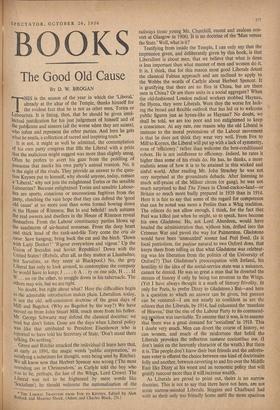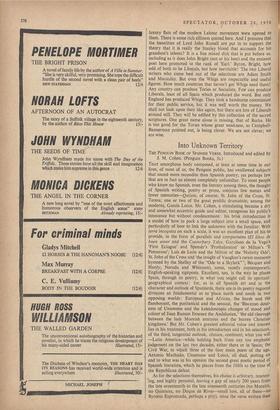BOOKS
The Good Old Cause
BY D. W. BROGAN irHIS is the season of the year in which the `Liberal,' already at the altar of the Temple, thanks himself for the evident fact that he is not as other men, Tories or Labourites. It is fitting, then, that he should be given intel- lectual justification for his just judgement of himself and of the publicans and sinners (all the worse when they are saints), who infest and represent the other parties. And here he gets what he needs, a collection of sacred and inspiring texts.* It is not, it might as well be admitted, the contemplation of his own party congress that fills the Liberal with a pride that the malicious might suggest was more than slightly smug. Often he prefers to avert his gaze from the peddling of Panaceas that marks his own party's annual reunion. No, it is the sight of the rivals. They *vide an answer to the ques- tion Keynes put to himself, why should anyone, today, remain a 'Liberal.' why not join the enlightened Tories or the sensible Labourites? Because enlightened Tories and sensible Labour- ites are sports, conscious or unconscious fugitives from the Party, clutching the vain hope that they can defend the `good old cause' at no more cost than some formal bowing down in the House of Rimmon. But lo and behold! each autumn the real owners and dwellers in the House of Rimmon reveal themselves. From the Labour constituency parties blows up the sandstorm of air-heated nonsense. From the deep heart and thick head of the rank-and-file Tory come the cris de cyeur. Save hanging; bring back the cat and the birch. `Down with Lady Docker!' Rigour everywhere and vigour.' Up the Union of Socialist and Soviet Republics! Down with the United States! (Rebels. after all, as they mutter at Llandudno; not Socialists, as they sneer at Blackpool.) No, the grey Liberal has only to look around, to contemplate the company he would have to keep; J . ... n A A. . ry on one side, H .. . Id W ... on on the other, to snuggle down in his tabernacle. The ethers may win, but we arc right. .
No doubt, bitt right about what? Here the difficulties begin as the admirable introduction makes plain. Liberalism. today, is not the old, self-consistent doctrine of the great days of Mill and Bagehot. (Why no Bagehot by the way?) We have moved on from John Stuart Mill, much more from his father. Mr. George Schwartz may defend the classical doctrine; we read but don't listen. Gone arc the days when Liberal policy was like that attributed to President Eisenhower who is reported to have told his Secretary of State. `Don't stand there I talking. Do nothing.'
Green and Ritchie attacked the individual (I learn here that, as early as 1891, the magic words `public corporation,' so satisfying a substitute for thought, were being used by Ritchie). We all know now that Herbert Spencer was wrong (`The most unending ass in Christendom,' as Carlyle told the boy who was to be, perhaps, the last of the Whigs. Lord Crewe). The Liberal was not to be frightened by mere words like `Socialism'; he should welcome the nationalisation of the * THE LIBERAL TRADITION FROM Fox TO KEYNES. Edited by Alan Bullock and Maurice Shock. (Adam and Charles Black, 25s.) railways (teste young Mr. Churchill, recent and zealous con- vert at Glasgow in 1906). It is no doctrine of the `Man versus the State.' Well, what is it?
Testifying from inside the Temple, I can only say that the impression given, and deliberately given by this book, is that Liberalism is about men, that we believe that what is done is less important than what manner of men and women do it. It is, I think, that for this reason most good Liberals detest the classical Fabian approach and are inclined to apply to the Webbs the words of Carlyle about Herbert Spencer. It is gratifying that there are no flies in China, but are there men in China? Or are there units in a social aggregate? When the old-fashioned London radical workers mobbed Haynau, the Hyena, they were Liberals. Were they the worse for lack- ing the broad and flexible outlook that has led us to welcome public figures just as hyena-like as Haynau? No doubt, we shall be told, we are too poor and too enlightened to keep a conscience. At any rate, one reason why the old Liberal is immune to the moral pretensions of the Labour movement is that he does not think they wear very well. From Fox to Mill to Keynes, the Liberal will put up with a lack of symmetry, even of 'efficiency,' rather than welcome the best-conditioned robots. He is not indifferent to efficiency. Indeed, he rates it higher than some of his rivals do. He has, he thinks, a more realistic sense of how it is to be attained in this wicked and sinful world. After reading Mr. John Strachey he was not very surprised at the groundnuts debacle. After listening to much self-praise of the Milner circus (or gang), he was not much surprised to find The Times in Cloud-cuckoo-land—or Britain so much more badly prepared in 1939 than in 1914. Here it is fair to say that some of the regard for competence that can be noted was more a Peelite than a Whig tradition. The editors do not allow enough, I think, for the fact that Peel was killed just when he might, so to speak, have become his own Gladstone. He, not Lord Aberdeen, would have headed the administration that, without him, drifted into the Crimean War and paved the way for Palmerston. Gladstone would have been `unmuzzled' sooner had Peel lived. (Is it local patriotism, the pudeur natural to two Oxford dons, that keeps them from telling us that what Gladstone was celebrat- ing was his liberation from the politics of the University of Oxford?) That Gladstone's preoccupation with Ireland, his hostility to the idea of the social-service state was a nuisance, cannot be denied. He was so great a man that he diverted the stream of history if only by being too reverent to the Whigs. (Yet 1 have always thought it a mark of literary frivolity, fit only for Paris, to prefer Dizzy to Gladstone.) But—and here is a question to which no answer can be given, but guesses can be ventured—I am not nearly so confident as are the editors that the Liberals, by 1914, had exhausted the 'mandate of Heaven,' that the rise of the Labour Party to its command- ing pgsition was inevitable. To assume that it was, is to assume that There was a great demand for `socialism' in 1918. This I doubt very much. Men can divert the course of history, so can women, and much of the misfortune that befell the Liberals provokes the reflection tanteene coelestibus inv. (I don't insist on the heavenly character of the wrath.) But there it is. The people don't know their best friends and the unfortu- nate voter is offered the choice between one kind of doctrinaire folly and another, between cavorting to and fro over the Middle East like Dizzy at his worst and an economic policy that will gratify rancour more than it will increase wealth.
As Liberals are proud to point out, theirs is no narrow doctrine. This is not to say that there have not been, are not some narrow-minded Liberals. Stiggins and Chadband had with us their only too friendly home until the more spacious luxury flats of the modern Labour movement were opened to them. There is some rich silliness quoted here. And I presume that the banalities of Lord John Russell are put in to support the theory that it is really the Stanley blood that accounts for his grandson's talents? It is a fine mixed dish that is put before us, including as it does John Bright (not at his best) and the eminent poet here promoted to the rank of `Earl.' Byron, Bright, how odd of both to be Liberals, but how inevitable! The two Liberal writers who come best out of the selections are Adam Smith and Macaulay. But even the Whigs are respectable and useful figures. How much countries that haven't got Whigs need them! Any country can produce Tories or Socialists. Few can produce Liberals, least of all Spain which produced the word. But only England has produced Whigs. They took a handsome commission for their public service, but it was well worth the money. We shall not look upon their like again, but there are lots of Liberals around still. They will be edified by this collection of the sacred scriptures. One great name alone is missing, that of Burke. He is too good for the Tories whose great weakness, as Campbell- Bannerman pointed out, is being clever. We are not clever; we are wise.











































 Previous page
Previous page